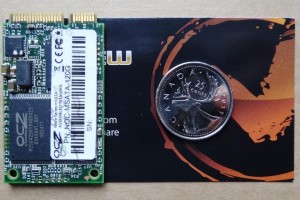The OCZ Nocti SATA 2 120GB mSATA SSD is on our bench today and, “Welcome to the Year of the mSATA SSD!”
Three years ago, one wouldn’t have imagined that we could get such power from an SSD that is 1/3 the size of a business card and the height of a 25 cent piece. This year already, mSATA SSDs have become standard in ultrabooks with talk now of cached SSDs present in the not far too distant future. This is a performance and capacity guarantee win-win for the consumer.
The golden key to this is, in order to meet the Intel ultrabook standard, price of these systems will have to remain relatively close to $1000, have a minimum 5 hours battery life and contain Intel Core i5 processors, along with being less than 3.1 lbs and 0.8″ thick. Our ultrabook of choice, at least up to this point, is the Toshiba Portege Z830 and today we will be swapping mSATA SSDs in order to get a long term feel of the Nocti.
INTRODUCTION
The OCZ Nocti mSATA SSD is availavle in 30, 60, or 120GB capacities and is the first we have tested with the LSI SandForce SF-2181 processor. It is one of the few mSATA SSDs available to the consumer and can be found on NewEgg, with pricing commensurate to SSD sizes at 74.99, 124.99 and 229.99. Performance is listed at 280MB/s read and 260MB/s write with a high of 32,000 IOPS at low 4k random aligned write disk access.

 The size of the Nocti is 30x50x3.5mm and it has a three year warranty. Nocti specifications can be found here and another very handy document that OCZ has available is their OCZ SSD Breakdown Chart. For any of you wondering, “Yes that is a Canadian quarter.” and Yes, we are a Canadian based website.” and “Yes, it snows here once in a while.” I just took this shot out the office window while compiling the article…
The size of the Nocti is 30x50x3.5mm and it has a three year warranty. Nocti specifications can be found here and another very handy document that OCZ has available is their OCZ SSD Breakdown Chart. For any of you wondering, “Yes that is a Canadian quarter.” and Yes, we are a Canadian based website.” and “Yes, it snows here once in a while.” I just took this shot out the office window while compiling the article…
The heart and sole of the OCZ Nocti is, of course, the LSI SandForce SF-2181 processor and this mSATA SSD happens to be the first that we have seen it in use. There are four modules of OCZ branded IMFT (Intel Micron Flash technologies) generic NAND flash memory and we are aware that it is 25nm asynchrous memory, with each chip being 32GB in capacity.
 The total RAW capacity of all NAND flash memory chips is 128GB, however, SandForce requires 8GB proprietary for their firmware and over provisioning needs, this bringing the unformatted total to the advertised 120GB. Final formatting leaves the end user with 112GB available storage space.
The total RAW capacity of all NAND flash memory chips is 128GB, however, SandForce requires 8GB proprietary for their firmware and over provisioning needs, this bringing the unformatted total to the advertised 120GB. Final formatting leaves the end user with 112GB available storage space.
 The SSD Review The Worlds Dedicated SSD Education and Review Resource |
The SSD Review The Worlds Dedicated SSD Education and Review Resource | 
What makes the RunCore so much faster? Sych or toggle nand?
The Runcore T50 is a SATA 3 SSD which accounts for the lionshare of difference in its performance, however, it also uses synchronous NAND flash memory.
Ahh…sata 3…that would explain it..lol
You mentioned “talk now of cached SSDs present in the not far too distant future.” Are you talking about drives such as the synapse used to speed up platter based HDD’s or are you talking about sticking some higher speed memory (ram) on the silicon and using the ram as a cache for the ssd?
Its an interesting concept that would probably require ultrathin 7mm hard drives along with mSATA SSDs with caching software although your latter idea is very interesting.
If it ever comes to market i’d like to people to know that I submitted the idea. No trademarks necessary I’d just like recognition 😛
It looks like a UFO in that picture of the snow…2nd pine tree from the left..at the tip.
That is a UFO. We get tons of them in Canada. They were the first to put me onto SSDs you know. eheh
Have you tested this drive in the Z830? i have the standard tosh drive in my Z830 currently and would like to know if this is a worthy upgrade as the flaky nature of SATA3 discovered in the SSDReviews Z830 is not enough to swing me towards a SATA3 drive currently!
Yes this drive works fine in th Z830 and this is a SATA 2 drive.
excellent, so it shows better performance on the Z830 than the standard tosh drive (which we all know is frankly a bit pants) as in i wont be stuck on crummy 5.9 windows experience and woeful benchmark results in my shiny sexy Z830? 🙂
I am in Germany so I can’t test the WEI score with that drive but can assure you it is a huge step up from the Toshiba. As a matter of fact, any mSATA I have tested is a step up from the Tosh.